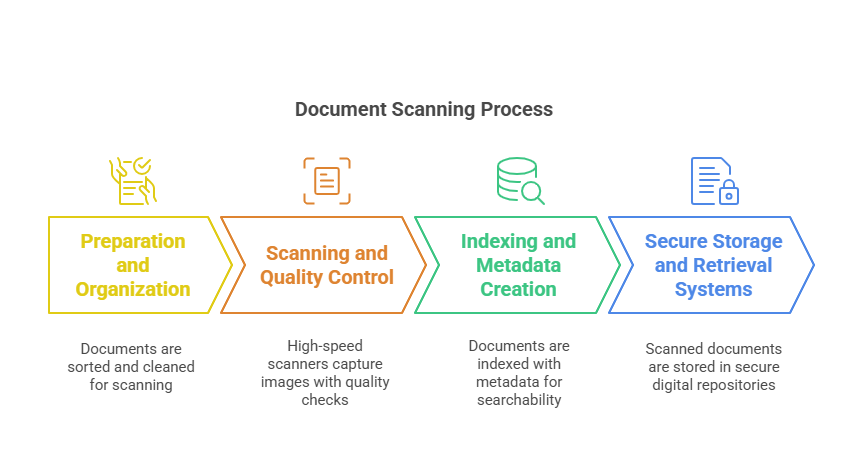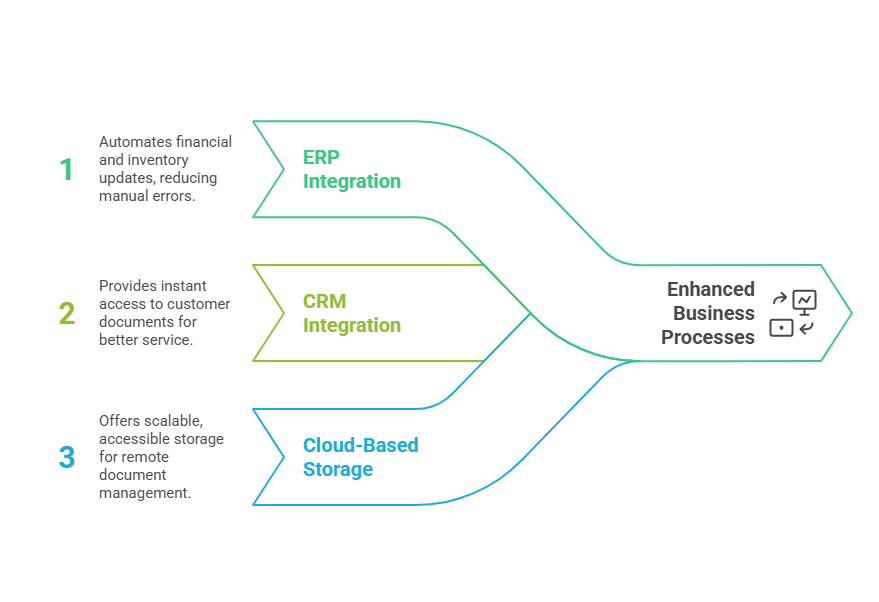In today’s fast-paced business world, efficient document management is crucial for success. Document scanning services offer a powerful solution to streamline your operations and boost productivity. By turning paper documents into digital files, businesses can improve how they handle information. This leads to better efficiency, lower costs, and stronger security. Let’s explore how these services can change your business for the better and help it keep up with the digital age.
Key Benefits of Document Scanning Services
- Improved efficiency and accessibility: Digital documents are easily searchable and accessible from anywhere with an internet connection, significantly reducing time spent on document retrieval
- Enhanced security and compliance: Digital documents can be protected with advanced security measures like encryption and access controls, ensuring data integrity and regulatory compliance
- Cost savings on physical storage: Digitizing documents reduces the need for physical storage space, lowering overhead costs and freeing up valuable office real estate
- Streamlined business operations: Faster access to information allows teams to focus on more critical tasks, improving overall productivity and decision-making processes
- Environmental impact: Reducing paper usage contributes to sustainability efforts and aligns with corporate social responsibility initiatives
Table of Contents

The Evolution of Document Management
The move from paper to digital document management has changed how businesses handle information. Document digitization is now essential for modern organizations. It allows faster access, better security, and lower storage costs. This change is a big shift in how businesses work, moving from bulky filing cabinets to efficient digital systems that can be accessed instantly from anywhere in the world.
Core Benefits of Document Scanning Services
Using document scanning services can bring many advantages to your organization, changing how you manage information and run your business:
Enhanced Efficiency and Accessibility
Digital documents are easy to search and access from anywhere with internet. This quick access greatly reduces time spent looking for information, letting your team focus on more important tasks. With powerful search tools, employees can find specific documents or information in seconds, instead of digging through physical files for hours. This improved access also helps with remote work and teamwork, letting teams get the documents they need no matter where they are.
Improved Security and Compliance
Digital documents can be protected with strong security measures, like encryption and access controls. This better security helps follow rules like HIPAA and GDPR, which is important for many industries. Digital document systems allow fine control over who can access, edit, or share specific documents, creating a clear record of document activities. This level of control and tracking is nearly impossible with physical documents, making digital systems much better for following regulations and protecting sensitive information.
Cost Savings on Physical Storage
By making your documents digital, you can greatly reduce the need for physical storage space. This means lower overhead costs and better use of your office space. Getting rid of physical storage not only reduces direct costs of renting storage space but also cuts indirect costs like maintenance, climate control, and security for physical document storage areas. Also, digital storage solutions often offer scalable options, letting businesses pay only for the storage they need and easily grow as their document volume increases.
Environmental Impact
Reducing paper use through document scanning helps create a more sustainable business model, matching growing environmental concerns and corporate responsibility efforts. By using less paper, businesses can significantly reduce their carbon footprint, save natural resources, and show commitment to environmental care. This eco-friendly approach can improve a company’s reputation among environmentally aware consumers and stakeholders, potentially leading to better brand image and customer loyalty.
Types of Document Scanning Solutions
Document scanning services come in different forms to meet various business needs, each offering unique benefits depending on what an organization specifically requires:
On-Site vs. Off-Site Scanning
Off-site document scanning offers extra security and special equipment, while on-site scanning gives immediate access and control over the process. Off-site scanning is often better for large-scale digitization projects or when dealing with very sensitive documents that need special handling. On-site scanning is ideal for businesses that need constant access to their documents or worry about moving sensitive information off-site.
Bulk Document Scanning Services
For businesses with lots of documents, bulk document scanning services offer an efficient way to digitize entire archives quickly. These services use high-speed scanners and automated processes to handle large amounts of documents in a short time. Bulk scanning is especially helpful for organizations doing a complete digital transformation or those wanting to clear out large physical archives.
Specialized Scanning for Different Industries
Many industries need specific document handling processes. Specialized scanning services cater to these unique needs, ensuring compliance and optimal data management. For example, healthcare providers might need HIPAA-compliant scanning services that can handle medical records with the right level of security and privacy. Legal firms might need services that can accurately capture and index complex legal documents, while financial institutions may require scanning solutions that can handle checks and other financial documents with high precision.
Technology Behind Document Scanning
Modern document scanning services use advanced technologies to ensure accuracy and efficiency, always improving to meet the growing demands of digital document management:
High-Speed Scanners and Imaging Equipment
Modern scanners can process thousands of pages per hour, keeping high image quality and accuracy. These advanced scanners often have automatic document feeders, can scan both sides of a page at once, and have image enhancement technologies that can improve the readability of even poor-quality original documents. Some high-end scanners also have special detectors to prevent errors and make sure every page is scanned accurately.
Optical Character Recognition (OCR) Technology
OCR technology turns scanned images into searchable and editable text, making digitized documents more useful. Modern OCR systems use machine learning to improve accuracy and can handle different fonts, languages, and even handwriting. This technology is crucial for creating fully searchable digital archives, allowing users to quickly find specific information within large document collections.
Document Management Software Integration
Smooth integration with document management systems allows for efficient organization, retrieval, and collaboration on digitized files. These systems often include features like version control, workflow automation, and advanced search capabilities. Integration with popular business software ensures that digitized documents can be easily incorporated into existing business processes, maximizing the value of the scanning service.

The Document Scanning Process
Understanding how document scanning works can help you prepare for a smooth change to digital document management. This process usually involves several key steps, each important for ensuring the quality and usability of the digitized documents:
Preparation and Organization
Documents are sorted, cleaned, and prepared for scanning to ensure the best results. This step involves removing staples and paper clips, unfolding creased pages, and organizing documents into batches for efficient scanning. Proper preparation is essential for getting high-quality scans and minimizing errors during the digitization process.
Scanning and Quality Control
High-speed scanners capture document images, followed by quality checks to ensure clarity and completeness. During this step, operators may adjust scanner settings to optimize image quality for different document types. Quality control measures often include visual inspections and automated checks to identify issues such as skewed images, poor contrast, or missing pages.
Indexing and Metadata Creation
Documents are indexed with relevant metadata, making them easily searchable in digital systems. This process involves assigning key information such as document type, date, author, and other relevant details to each scanned file. Effective indexing is crucial for creating a searchable and well-organized digital archive.
Secure Storage and Retrieval Systems
Scanned documents are stored in secure digital repositories, accessible through user-friendly interfaces. These systems often have advanced security features such as encryption, access controls, and audit trails to protect sensitive information. Cloud-based storage solutions are becoming more popular, offering scalability and remote access capabilities.
Industry Applications of Document Scanning
Document scanning services benefit various industries, each with unique requirements and challenges in managing their information:
Healthcare and Medical Records
Digital medical records improve patient care, streamline operations, and ensure HIPAA compliance. In healthcare, document scanning allows faster access to patient histories, helps securely share medical information between providers, and supports telemedicine. Digitized records also reduce the risk of lost or damaged files, ensuring continuity of care.
Legal and Financial Services
Law firms and financial institutions use document scanning to manage vast amounts of sensitive information securely. In the legal field, digitized documents support e-discovery processes, facilitate case management, and enable remote collaboration among legal teams. Financial institutions benefit from improved transaction processing speeds, enhanced fraud detection capabilities, and simplified regulatory compliance.
Government and Public Sector
Government agencies use document scanning to enhance public service delivery and maintain transparent record-keeping. Digitization supports open government initiatives, improves response times for public information requests, and facilitates inter-agency collaboration. It also plays a crucial role in disaster recovery planning, ensuring that vital records are preserved and accessible in case of physical damage to archives.
Education and Research Institutions
Universities and research centers digitize archives and student records for improved accessibility and preservation. Digital archives support remote learning initiatives, facilitate global research collaborations, and help preserve historical and cultural documents. In academic settings, digitized student records streamline administrative processes and support data-driven decision-making in educational management.
Security and Compliance in Document Scanning
Ensuring the security of sensitive information is very important in document scanning services, especially as data protection rules become stricter:
Data Protection Measures
Strong encryption and access controls protect digitized documents from unauthorized access. Modern document scanning services use multi-layered security approaches, including end-to-end encryption for data in transit and at rest, multi-factor authentication for user access, and regular security checks to identify and address potential vulnerabilities.
Regulatory Compliance
Document scanning services follow industry-specific regulations like HIPAA, SOX, and GDPR to ensure legal compliance. This involves implementing strict data handling protocols, regular staff training on compliance requirements, and maintaining detailed records of data processing activities. Many service providers also offer customized compliance solutions tailored to specific industry regulations.
Chain of Custody and Audit Trails
Detailed tracking of document handling provides accountability and transparency throughout the scanning process. Advanced document management systems maintain comprehensive logs of all document interactions, including who accessed files, when they were viewed or modified, and any changes made. This level of detail supports both internal governance and external compliance audits.
For more information on legal considerations, check out our guide on legal considerations for document digitization.
Integrating Document Scanning with Existing Systems
Smooth integration is key to maximizing the benefits of document scanning services, ensuring that digitized documents become an important part of your business processes:
Enterprise Resource Planning (ERP) Integration
Connecting scanned documents to ERP systems streamlines business processes and improves data flow. This integration allows for automatic updating of financial records, inventory management, and supply chain documentation. By linking scanned invoices, purchase orders, and shipping documents directly to ERP systems, businesses can reduce manual data entry, minimize errors, and gain real-time insights into their operations.
Customer Relationship Management (CRM) Integration
Linking customer documents to CRM platforms enhances customer service and relationship management. This integration provides customer service representatives with instant access to relevant customer documents, such as contracts, correspondence, and service histories. It enables more personalized and efficient customer interactions, leading to improved customer satisfaction and loyalty.
Cloud-Based Storage and Accessibility
Cloud integration provides scalable storage solutions and enables remote access to digitized documents. Cloud-based document management systems offer many advantages, including automatic backups, easy scalability, and the ability to access documents from any device with an internet connection. This flexibility supports remote work arrangements and facilitates collaboration across geographically dispersed teams.

Choosing the Right Document Scanning Service Provider
Selecting the right partner for your document scanning needs is crucial for success, as it can significantly impact the efficiency and effectiveness of your digital transformation:
Key Factors to Consider
Look for providers with industry experience, advanced technology, and strong security measures. Consider factors such as the provider’s track record in your specific industry, their ability to handle your document volume and types, and their approach to data security and compliance. It’s also important to evaluate their customer support capabilities and the flexibility of their solutions to meet your unique business needs.
FileVault’s Expertise and Experience
At FileVault, we offer comprehensive records management services tailored to your specific needs. Our expertise ensures a smooth transition to digital document management. With years of experience serving diverse industries, we understand the nuances of different document types and regulatory requirements. Our state-of-the-art scanning technology, coupled with rigorous quality control processes, ensures that your digitized documents are accurate, secure, and easily accessible.
Future Trends in Document Scanning and Management
The field of document scanning continues to evolve with new technologies, promising even greater efficiencies and capabilities in the future:
Artificial Intelligence and Machine Learning
AI-powered systems are improving document classification and data extraction accuracy. Machine learning algorithms can now recognize patterns and extract relevant information from complex documents with minimal human help. This technology is particularly useful for processing unstructured data, such as handwritten notes or non-standard forms, significantly reducing the time and effort required for document processing.
Blockchain for Document Verification
Blockchain technology is being explored for enhancing document authenticity and security. By creating an unchangeable record of document transactions and modifications, blockchain can provide an unprecedented level of trust and transparency in document management. This technology has the potential to revolutionize industries where document authenticity is critical, such as legal services, real estate, and financial transactions.
Advanced Analytics for Document Insights
Data analytics tools are providing valuable insights from digitized document collections. By analyzing large volumes of digitized documents, businesses can uncover trends, identify inefficiencies, and make data-driven decisions. These analytics capabilities can transform static document archives into dynamic sources of business intelligence, supporting strategic planning and operational improvements.
Transforming Business Operations with Document Scanning
Document scanning services offer a powerful way to modernize your business operations, improve efficiency, and ensure compliance. By digitizing your documents, you can unlock new levels of productivity and data management. The benefits go beyond just digitization, including improved accessibility, enhanced security, cost savings, and environmental sustainability. As technology continues to advance, the potential for document scanning to drive business transformation only grows, making it an essential consideration for forward-thinking organizations.

At FileVault, we provide comprehensive document scanning solutions tailored to your specific needs. Our expertise and advanced technology ensure a smooth transition to digital document management, helping your business stay competitive in the digital age.
We understand that every organization has unique document management challenges, and we work closely with our clients to develop customized solutions that address their specific requirements and goals.
Ready to transform your document management processes? Contact FileVault today to learn how our document scanning services can benefit your business. Our team of experts is ready to guide you through the process, from initial assessment to full implementation, ensuring that your transition to digital document management is smooth, efficient, and tailored to your organization’s unique needs. Take the first step towards a more efficient, secure, and sustainable future for your business with FileVault’s document scanning services.
